|
Do Mention the War
It is inevitable that the ‘Martin Bora’ novels of Ben Pastor will be compared to the ‘Bernie Gunther’ thrillers of the late Philip Kerr. Both feature German protagonists caught up in the maelstrom of World War II, and although there are clear differences – Gunther is a socialist-leaning cynical detective who is a reluctant soldier; Bora is an aristocrat, devout Catholic and professional soldier who finds himself a reluctant detective – both series of books share the same DNA of excellent story-telling.
 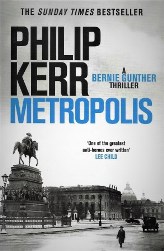
Coincidentally, Ben Pastor’s sixth Bora thriller, The Horseman’s Song, to appear here is now published by Bitter Lemon just as the last Philip Kerr novel, Metropolis is published posthumously next month by Quercus.
Both series place their protagonists in different settings and time periods, something guaranteed to upset the obsessive-compulsive reader who wants to read a series ‘in chronological order’. Metropolis is set in the Weimar Germany of 1928, whereas The Horseman’s Song has Martin Bora earning his spurs as an army officer fighting for the Nationalists in the Spanish Civil War in 1937.
There are, I think, thirteen Bora novels so far published in Italy (although written in English by the bilingual Verbena Pastor), but only six have made it to the UK, covering Bora’s wartime career, as a Wehrmacht officer, in Poland, Rome, Verona, Crete and the Russian front. In The Horseman’s Song, we find a younger Bora on the front line of a vicious civil war in the hot, dusty sierras outside Aragon, struggling with his conscience and academic training as a philosopher, at the random and senseless violence around him. His story is counterpointed by that of an American fighting for the other side as a volunteer in the International Brigade, and the two collide when the body of the famous poet Garcia Lorca is found in no-man’s land.
Initially suspected of murdering the poet himself, Bora is drawn into playing detective, blissfully unaware (initially) of the hornets’ nest he is kicking. At one chilling point, a suspicious German Abwehr officer tells him: ‘You’re not nearly as clever as you think, but it’s fun watching you try.’
The Horseman’s Song (a reference to a Lorca poem) is a long, detailed study of a thinking, professional soldier who has, on a daily basis, to balance the danger, boredom, waste and pain of a military life with his privileged upbringing, his cultural and religious beliefs and his sense of duty. Nobody does that better than Ben Pastor.
 Turning to the home front, specifically Cambridge, in WWII, Jim Kelly gives us a second case for Detective Inspector Eden Brooke, set in early 1940 in The Mathematical Bridge, out now from Allison & Busby. Turning to the home front, specifically Cambridge, in WWII, Jim Kelly gives us a second case for Detective Inspector Eden Brooke, set in early 1940 in The Mathematical Bridge, out now from Allison & Busby.
Eden Brooke is a fascinating character, a ‘nighthawk’ in that his eyesight really only works at night following a traumatic event during the First World War. In some ways this gives him an advantage in the black-out of wartime Cambridge, but not necessarily one he wants especially when a young boy is placed in a sack and thrown into the River Cam to drown like an unwanted pet.
The young victim turns out to be one of a group of Irish children evacuated from a poor London parish and an Irish connection looms large when there is an explosion at an electronics factory engaged in war work (damaging an early television transmitter) which seems like the work of the IRA.
As well as providing a satisfying mystery, Jim Kelly conjures up a wintry wartime Cambridge very well, with one or two nice touches such as the venerable Michaelhouse College and a college porter with the superb name of Doric.
Thrilling Lunches
I shamelessly took the opportunity at a splendid lunch thrown by Transworld for two of their notable thriller writers, to present one of them, Tom Bradby, with a copy of my ‘reader’s history’ of British thrillers Kiss Kiss Bang Bang (out in paperback this month; just saying), for the very good reason that he is mentioned in it.

Tom Bradby, journalist and now anchorman of ITV’s News At Ten, is of course far too young to feature in my book, which covers the period 1953-1975, but he is cited in a footnote for an Introduction he wrote to the reissue of Gerald Seymour’s 1975 thriller Harry’s Game. As a quid-pro-quo, I was delighted to receive a proof of Tom’s forthcoming thriller Secret Service which is published by Bantam in May. Tom’s first novel for ten years poses the question What if you knew the next prime minister was a Russian spy? To which my answer would be that I wouldn’t be at all surprised.

Sadly my book on thrillers did not seem to please fellow diners the best-selling author Robert Goddard and the distinguished critic Marcel Berlins, despite my protestations that Robert, although a major British thriller writer, was also too young to fit into the period of history I had covered.
However, we weren’t there to celebrate my book (not even the forthcoming revised and expanded paperback version…) but to hear of Tom’s forthcoming novel and to celebrate Robert’s twenty-seventh and latest, One False Move, now out from Bantam, which is set in the world of computer games, a world which turns out to be anything but playful. Congratulations are to be extended to Robert as he is this year’s recipient of the CWA’s Diamond Dagger.
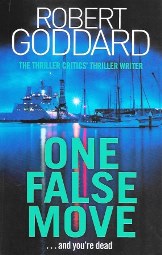
Blogging Down Under
That wise and discerning Australian reviewer of crime fiction Jeff Popple (Canberra Times, Canberra Weekly, Deadly Pleasures, etc.) has ventured into the blogosphere and launched murdermayhemandlongdogs.com to share his interests in murder and mayhem when it comes to fiction and ‘long dogs’, which is not a new sub-genre of hard-boiled Westerns but refers to Jeff’s own very real dachshunds, which don’t look hard-boiled at all.
Jeff has kicked off his blog by announcing a regular feature, Trashy Tuesday, which highlights the rather garish covers used on thrillers of a certain era, a subject close to own heart. His first choice is a 1971 Australian Pan edition of Victor Canning’s The Whip Hand.

All the standard tropes are there: the blonde in the bikini, the Schmeisser-wielding Nazi thug and, of course, the swastika. But, as Jeff rightly points out, do not be fooled or too quick to judge a book by its cover. Victor Canning (1911-1986) was a far better writer than this ‘bang-bang’ cover might suggest and The Whip Hand, first published in 1965, introduced a short series of novels featuring Rex Carver, a British private eye with close links to the Intelligence services.
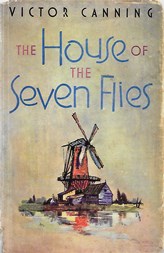
Long before then, Canning was a best-selling author, specialising in thrillers mostly set in foreign countries because, as he said, ‘in England you could always call a policeman’ and many were based on his experiences in Europe during World War II when he formed a friendship with Eric Ambler. I have been tracking down some of his earlier work and recently treated myself to a much-loved first edition of The House of the Seven Flies, his 1952 treasure-hunt adventure set in Holland. Canning’s clear, straight-forward prose, a vulnerable hero and considerable feel for the watery Dutch landscape, boats and sailing, still works very well indeed. The novel is older than I am, and certainly holds up better.
Seven Dials
Tredwells, the most relaxed and informal of Marcus Wareing’s London restaurants, has long been a favourite of mine when in the Seven Dials area, although I have only just discovered that it was named after a character in an Agatha Christie novel.
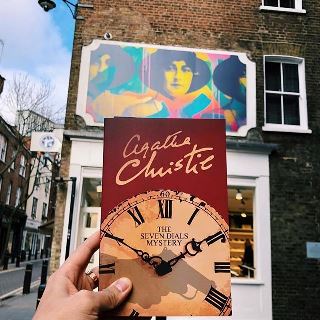
Tredwell, it seems, was the butler in Agatha’s 1929 novel The Seven Dials Mystery (he also appeared in 1925 in The Secret of Chimneys) and free copies of that book were among the prizes in last month’s promotion of the shops and attractions in Seven Dials with, I believe, the support of Agatha Christie Ltd.
Sadly I was unable to participate as the promotion involved quizzes and treasure hunts using “social media” – whatever that is.
I Spy
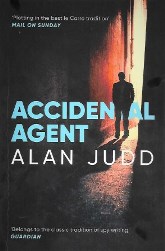 I hear rumours everywhere that the spy story is making a come-back, to which my usual response is: did it ever go away? The villains may change – Cheka, OGPU, Nazis, KGB, Stasi, so forth, so fifth – and the conflicts; the current battleground, not surprisingly, being that special place in Hell, Brexit. Mick Herron gave us a tongue-in-cheek novella The Drop late last year and now Alan Judd puts Brexit shenanigans centre stage in his new novel Accidental Agent from Simon & Schuster. I hear rumours everywhere that the spy story is making a come-back, to which my usual response is: did it ever go away? The villains may change – Cheka, OGPU, Nazis, KGB, Stasi, so forth, so fifth – and the conflicts; the current battleground, not surprisingly, being that special place in Hell, Brexit. Mick Herron gave us a tongue-in-cheek novella The Drop late last year and now Alan Judd puts Brexit shenanigans centre stage in his new novel Accidental Agent from Simon & Schuster.
Judd’s gentle and gentlemanly head of MI6 Charles Thoroughgood (a happily-married Smiley rather than a randy Bond) is overseeing a valuable source of inside information coming from a mole code-named Timber Wolf, within the EU Brexit negotiating team. But is the Euro-mole too good to be true and is his MI6 handler really to be trusted? As spying on one’s European Union partners is frowned upon by MI6’s political masters (though they love the information being gleaned), Thoroughgood has to tread carefully as well as dealing with a possible terrorist threat close to home and the Health & Safety protocols nowadays involved when a British spy goes overseas. He also has to keep an eye on internal complaints raised through Human Resources when a senior MI6 officer is accused of sexual harassment.
The accusation is a vague one and seems to baffle our spy chief (who is Old School and still thinks of HR as ‘Personnel’), as female staff members feel uncomfortable around the accused and they call him ‘the bus conductor…because he’s always jiggling the loose change in his pocket when he talks to them’. No wonder the head of MI6 is bemused. When did anyone last see a bus conductor?
Don’t expect bombs, bullets and car chases, but Accidental Agent delivers on many levels; a character-driven, very English spy story which could not be more topical, even though the facts of the Brexit negotiations have proved more fantastical that Judd’s fiction.
Half Century
The distinguished crime writer Peter Lovesey is celebrating his 50th year on the dark side of fiction, but there is absolutely nothing of the Darth Vader about Peter, who is to receive a Lifetime Achievement award at the Bouchercon convention (also, I believe, in its fiftieth year) in Dallas in the Autumn.

When Peter was awarded the Cartier Diamond Dagger in 2000 (after thirty years in the business), I interviewed him for a well-known magazine and cheekily asked that as he had a lifetime achievement award, could he stop now? Thankfully, a second lifetime achievement has had little effect on Peter’s output as a new novel featuring his policeman hero Peter Diamond, Killing With Confetti, will be published by Sphere in July.
|
|
Initially
P.D. James may have established the fashion, though Phyllis was not the first female author to disguise her sex, but the use of initials rather than forenames among crime writers seems to be growing.
At the recent Penguin Crime party, it was a pleasure to put a forename to C.J. Tudor (Caroline and not Cartimandua as I had hoped), the author of The Taking of Annie Thorne which I recommended as one of the books of last month.

I must add a warning to my recommendation as this is not a straightforward crime novel, but a very scary horror story of things buried in the abandoned mine-workings of the Nottinghamshire coalfields. As someone born and raised in a West Yorkshire mining village, it confirms all my suspicions and prejudices about Nottinghamshire mining villages, and has an added bonus in the form of a wonderfully cool (and cold-hearted) hit-woman almost as terrifying as the Mary J. Blige character in The Umbrella Academy.[I throw that in just to show I am down with the kids.]
Penguin seem to have cornered the market in authors preferring to be known by initials. In June, they will publish The Poison Bed by E.C. Fremantle, a historical mystery set in 1615 described as ‘The Miniaturist meets Gone Girl’. As Elizabeth Fremantle, the author is known for her four Tudor historical novels.
P.J. Tracy is a well-known name in American crime writing and was the pseudonym of mother-and-daughter team Patricia and Tracy Lambrecht. Since the death of Patricia (the original ‘P.J.’ in 2016, Traci has continued to write under the pen-name and in August, Penguin publish her latest, Ice Cold Heart.
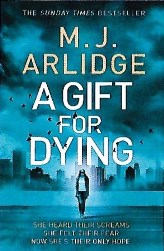
M.J. Arlidge, sometimes known as Matt, is another Penguin author with a new novel out this month. A Gift For the Dying is a stand-alone thriller set in America, rather than one of his immensely successful series of DI Helen Grace novels, all of which had creepy nursery-rhyme related titles such as Eeny Meeny, Little Boy Blue and Hide and Seek. The particular ‘gift’ in his new novel belongs to a teenage girl who not so much ‘sees dead people’ but rather sees how living people are going to die (spoiler alert: usually horribly).
But Penguin do not have a total monopoly on authors with initials who have new books out this month. Avon have at least two that I know of. The well-established C. L. (better known as Cally) Taylor has chosen a remote hotel on a remote Scottish island (actually Rum isn’t that remote, but it is sufficiently isolated to qualify as a seriously spooky setting) for Sleep.

Relatively new to the crime scene, with his second novel from Avon is M.J. (Michael?) Ford with Keep Her Close. Ford’s Oxford-based detective Josie Masters, investigating the disappearance of female college students, comes, as do all fictional detectives, with a certain amount of emotional baggage. In the case of detective Sergeant Masters, what haunts her from the past is not so much an emotional back story but full blown PTS following a police pursuit that went horribly – and credibly – wrong.
One of the most well-known sets of initials after ‘P.D.’ and ‘J.K.’ is ‘R.J.’ as in R.J. (Roger) Ellroy, who also has a new thriller out this month from Orion. No stranger to setting his crime fiction in America, I don’t believe Roger has ever conjured an alternate American history for one of his novels before.
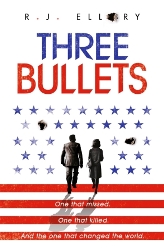
Three Bullets begins on November 23rd 1963 – note the date – when an unfired bullet is found on the sixth floor of the Texas School Book Depository in Dallas. Fast forward to July 1964 and President Jack Kennedy is alive, well and playing to his strengths in what might be called bedroom diplomacy. Conspiracy theorists, form a queue…
More Alternatives
And speaking of alternative histories, just as we are about to embark on one after Brexit, a new debut novel coming in April from Penguin poses that old favourite, an alternate ending to World War II.
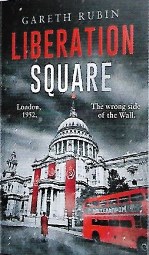
The setting for Gareth Rubin’s Liberation Square is a1952 Britain which had to be rescued by both Soviet and American forces after the D-Day landings went disastrously wrong. As a result the country (and London) is split down the middle by the occupying forces. (Think Man in the High Castle but with a no man’s land around Watford.)
The idea of a Britain occupied by a Marxist regime is not just confined to the Conservative Party manifesto, but was fictionally done, quite successfully, in a trio of novels by army officer-turned-thriller-writer Clive Egleton, beginning with A Piece of Resistance in 1970.

However, I have never come across a crime novel before where the alternate historical background is based on the fact the Ottoman Empire has ruled Europe with an iron fist for the last 300 years.
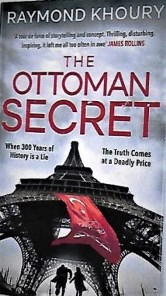
The Ottoman Secret by Raymond Khoury, coming from Penguin in May, seems to be centred on Paris, so I am not yet clear as to where Britain stands in the Ottoman controlled, Islamic Caliphate of Europe (insert Brexit joke here) but I am dying to find out.
Justified
An entire industry has grown up in recent years reissuing “unjustly forgotten classics” from the so-called Golden Age of the English detective novel, many of which are long out of print and, perhaps more importantly, out of copyright and thus royalty-free.
With the best will in the world, they can’t all be unjustly forgotten masterpieces and for many titles, there is a logical reason why they have been out-of-print for eighty years or more. That’s not to say, however, that there might be nuggets worth finding and hunting for truffles on that damp forest floor with some degree of success is the Dean Street Press.
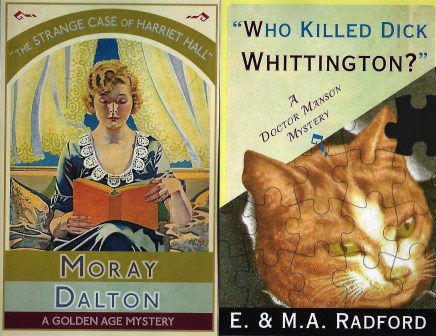
The latest offerings from Dean Street date from 1936 and 1947 and I cheerfully admit that I had heard of neither, nor of their authors, or perhaps I have unjustly forgotten them.
The Strange Case of Harriet Hall by Moray Dalton is a case for Inspector Hugh Collier, the detective hero of most of the twenty-nine detective novels by ‘Moray Dalton’, the pen-name of Katherine Dalton Renoir (1881-1963). Five other Dalton titles are available from Dean Street
Who Killed Dick Whittington? is a case for Dr Harry Manson; ‘a neglected figure, unjustly so, amongst Golden Age crime fiction detectives’, or so it says in the Introduction. Created by the married couple E. and M.A. Radford in 1944, Dr Manson is a ‘Chief Detective-Inspector of Scotland Yard and Head of its Crime Research Laboratory’ (sic) who went on to feature in thirty-five mysteries. The writing team of Edwin Isaac (1891-1973) and Mona Augusta Radford (1894-1990) published crime novels on an almost annual basis from 1944 until 1972, which I am not sure qualifies them or their detective as genuine ‘Golden Age’ figures.
However I am far too old and frail to get involved in a debate as to when the ‘Golden Age’ ended as devotees of the era do take such matters seriously, often personally. But since you ask, I would date the end as coming in 1949, the year in which Cluedo (Clue in America) was invented, when real cardboard pieces replaced cardboard characters.
Caledonia Calling
I am told that North Carolina has the largest number of Caledonian societies in the world and hosts more Highland Games than Scotland does. I am sure Ian Rankin knew all this before he visited one of my favourite colonial outposts last month.

Whilst there, he visited one of my favourite American bookstores, Quail Ridge Books in Raleigh, and met with one of my favourite American mystery writers, Margaret Maron, the first lady of North Carolina crime writing. I’m really rather jealous about the whole affair, especially if Ian was granted the 10% Readers Club discount I was on my last visit.
Girl Walking Away
A reader in the United States has done nothing to ease my paranoia about the spread of the ‘girl walking away’ motif which adorns so many book covers these days.

It appears that a GWA is now one of the official logos used to warn of an approaching cold snap on the National Weather Service website, at least in Minneapolis where, I believe, cold snaps do occasionally take place and females invariably can be seen walking away.
29 days or thereabouts
to the cliff edge.

Happy Landings,
The Ripster.
|